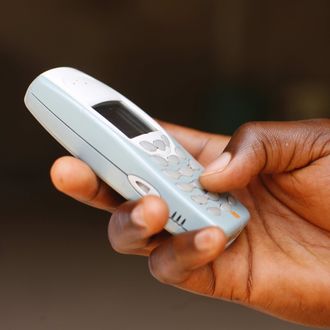
One of the more long-standing, tricky findings of social science is that it’s really, really hard to get people to stick to plans. Sometimes this means they keep on 20 pounds they had hoped to lose with a few months of exercise. Sometimes, as in the case of taking anti-malarial medication, the results can be a matter of life and death. A new study in PLOS ONE explores how text messaging can help short-circuit this aspect of human nature, and it garnered some positive results.
Each year, malaria kills over 600,000 people, more than half of them children. In a study published today in PLOS ONE , researchers with the non-profit Innovations for Poverty Action (IPA) and Harvard University found that simple text message reminders to take malaria medication can help in the fight against the disease by boosting the rates at which patients complete their medication regimen.
One challenge in fighting malaria is that the disease has evolved resistance to many drugs that formerly worked, according to Julia Raifman, a Ph.D. candidate in the Harvard School of Public Health, who co-authored the study. Only one class of drugs, artemisinin-based combination therapies (ACTs) remains effective and available. “When patients don’t complete their full medication regimen, diseases can develop resistance to treatment. And with infectious diseases like malaria, drug resistant diseases can spread to others” Raifman said. “Even in the United States, studies show that about half of people don’t adhere to their medications—it’s easy to forget, or to think you’ve beaten the disease because you feel better. We’ve already begun to see resistance to artemisinin in Southeast Asia. It would be catastrophic if that became widespread and there was no effective treatment for the most deadly form of malaria,” she added.
The researchers, working with IPA’s research staff in Ghana, drew on previous research using SMS reminders in situations where people fail to follow through on intentions, such as saving money, paying back loans, or completing college financial aid forms. The research staff in Ghana recruited more than 1,100 people outside pharmacies and healthcare facilities, who then used their mobile phones to enroll in an automated system. The system randomly assigned half to receive the text message reminders to take their medication at the 12 hour intervals corresponding to when the pills were to be taken. The local staff followed up with the participants several days later at their homes to check how many pills they had taken. Study authors Raifman, Heather Lanthorn, Slawa Rokicki, and Günther Fink found that those who received the texts were significantly more likely to finish the full regimen.
Another interesting nugget: Short text messages were significantly effective, while longer ones weren’t, and the researchers aren’t quite sure why.
A lot of this comes back to the idea that awareness is overrated. You can know that you need to take a given medicine in order to save your life, but still fall victim to all sorts of seemingly unimportant distractions that prevent you from doing so. A texting program like this one acts as a distraction in the other direction — it inserts itself in your life and says, Hey, this is really something you gotta do.




